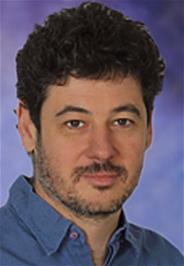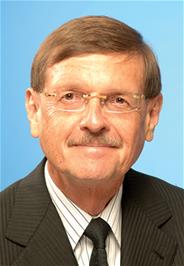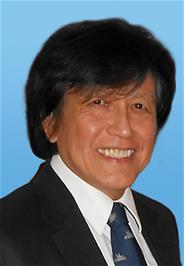Leaders
The Institute of Molecular and Cell Biology (IMCB) has been guided by a legacy of distinguished leaders whose strategic vision and commitment to scientific excellence have played a crucial role in shaping the institute's reputation as a global leader in biomedical research. Their leadership has driven innovation, fostered collaboration, and laid the foundation for IMCB's ongoing contributions to science and medicine.
Current Leader

XINYI SU
EXECUTIVE DIRECTOR SINCE 2024
EXECUTIVE DIRECTOR SINCE 2024
A/Prof Su Xinyi took on the role as Executive Director at IMCB with effect from 1 March 2024, stepping up from her previous roles as Acting Executive Director and Deputy Executive Director (Strategy and Transformation) at IMCB.
A/Prof Su, an A*STAR scholar, graduated with MB BChir PhD from the University of Cambridge (UK) and joined IMCB in 2016 as a clinician-scientist. She balances her time leading a broad retinal research program as Research Director at IMCB, while providing clinical leadership as Senior Consultant, Vitreo-Retinal Surgeon at the National University Hospital. A/Prof Su also holds joint appointments as Research Director at the Department of Ophthalmology (NUS), Co-Director at the Centre of Innovation and Precision Eye Health (NUS), and Clinician-Scientist at the Singapore Eye Research Institute (SERI).
Her research interests focus on harnessing biomaterial, regenerative stem-cell, and nucleic acid technologies for the treatment of age-related retinal degenerative disease. Her research has been published in, inter alia, Nature Biomedical Engineering, Nature Communications, Lancet Global Health, PNAS, and Advanced Materials. She is a recipient of multiple global and national awards, including the Asia-Pacific Academy of Ophthalmology’s Young Ophthalmologist Award (2019), the Asia-Pacific Vitreo-Retinal Society Leadership Development Program Gold Award (2020), Singapore Ten Outstanding Young Persons of Singapore Award (for Medical Innovation, 2021), Susan Lim Outstanding Stem Cell Young Investigator Award (2022) and National Medical Research Council Clinician Scientist Award (2022). In 2022, she was accepted into the prestigious international membership of The Macular Society.
Passionate about clinical translation of research, A/Prof Su holds several patents and co-founded an ISO 13485 (Medical Device Quality System) accredited spin-off company, Vitreogel Innovations, focussed on developing the next generation of vitreous substitutes. Beyond research, A/Prof Su is committed to people development and has mentored numerous clinician-scientists as the Deputy Director of the Clinician-Scientist Academy at NUHS.
Past Leaders

WANJIN HONG
EXECUTIVE DIRECTOR (2011-2023)
ACTING DIRECTOR (2001-2004)
EXECUTIVE DIRECTOR (2011-2023)
ACTING DIRECTOR (2001-2004)
Professor Wanjin Hong has made significant impact on the Institute of Molecular and Cell Biology (IMCB) over the years. He joined IMCB in 1989 as a Principal Investigator after completing his Ph.D. from the State University of New York (SUNY Buffalo) and postdoctoral training in the United States, following his graduation from Xiamen University in 1982. His contributions to Singapore's scientific community were recognized in 1999 when he received the National Science Award (Singapore).
As Acting Director from 2001 to 2004, Professor Hong played a crucial role in merging IMCB with the Institute of Molecular Agrobiology (IMA), relocating the expanded institute to Biopolis, and establishing a SARS research program in collaboration with Tan Tock Seng Hospital and Baxter Vaccines. These efforts significantly shaped the direction of IMCB.
Appointed Executive Director in 2011 after an international search, Professor Hong focused on repositioning IMCB by advancing research in cancer, infectious, metabolic, and neurological diseases, while also strengthening translational research to enhance IMCB’s impact on ASTAR's mission of promoting Singapore's economic growth. He prioritized the recruitment and training of young scientists and nurtured ASTAR scholars through the IMCB Independent Fellow (IIF) Programme.

Stephen COHEN
ACTING EXECUTIVE DIRECTOR (2010-2011)
He was a Howard Hughes Medical Institute Assistant Investigator at Baylor College of Medicine in Houston Texas, before moving to the European Molecular Biology Laboratory in 1993. In 1996, he became Head of the Developmental Biology Unit at EMBL and was elected as a member of the European Molecular Biology Organization.
In 2007 he moved to Singapore to assume the position of Executive Director at the Temasek Life Sciences Laboratory. In 2008 he was elected as a Fellow of the Royal Society of London.
ACTING EXECUTIVE DIRECTOR (2010-2011)
Professor Stephen Cohen received his Ph.D. from Princeton University. He did post-doctoral work at the Whitehead Institute at MIT and later at the Max Planck Institute in Tübigen Germany, where he began his studies on Drosophila developmental genetics.
He was a Howard Hughes Medical Institute Assistant Investigator at Baylor College of Medicine in Houston Texas, before moving to the European Molecular Biology Laboratory in 1993. In 1996, he became Head of the Developmental Biology Unit at EMBL and was elected as a member of the European Molecular Biology Organization.
In 2007 he moved to Singapore to assume the position of Executive Director at the Temasek Life Sciences Laboratory. In 2008 he was elected as a Fellow of the Royal Society of London.

Neal COPELAND
EXECUTIVE DIRECTOR (2007-2010)
EXECUTIVE DIRECTOR (2007-2010)
Professor Neal Copeland received his Ph.D. degree in Biochemistry from the University of Utah. He carried out postdoctoral training at Harvard Medical School before becoming Associate Staff Scientist at The Jackson Laboratory.
He then moved to the National Cancer Institute-Frederick as Senior Investigator. Prof Copeland headed the Molecular Genetics of Oncogenesis Section and also served as Director of the Mouse Cancer Genetics Program. For more than 30 years, he has worked together with Prof Nancy Jenkins to model many different types of human disease in the mouse but the focus of the current research is exclusively cancer.
They have published more than 750 papers and are also among the 50 most cited biomedical research scientists in the world today. In 2009, Professor Copeland was elected to the United States National Academy of Sciences for his continuing contribution and dedication to the furthering of scientific knowledge in the field of Genetics.
Professor Copeland streamlined operations at IMCB and implemented individual group research operating budgets. He also recruited renowned Drosophila geneticists Professors Stephen Cohen and Pernille Rorth and a talented young scientist, Dr Ernesto Guccione, as PIs.
.jpg?sfvrsn=8a5740a1_3)
Sir David LANE
EXECUTIVE DIRECTOR (2004-2007)
EXECUTIVE DIRECTOR (2004-2007)
Professor Sir David Lane obtained his Ph.D. from University College London where he studied auto-immunity. He then did his postdoctoral studies at the Imperial Cancer Research Fund (ICRF) London where he discovered the p53 tumour suppressor protein, and at Cold Spring Harbour Laboratories in New York where he developed monoclonal antibodies and discovered the p68 RNA helicase. In 1980, he returned to UK to set up his own laboratory at Imperial College London before moving his team to the ICRF at Clare Hall in 1985 and subsequently to Dundee University in 1990.
In 1996, he established Cyclacel, a cancer therapeutics company which has developed two new anti-cancer drugs currently in clinical trial. Sir David has won many international prizes and awards for his work and served on the advisory boards of several institutes.
Professor Sir David Lane helped to raise the scientific profile of IMCB by recruiting international leaders in research like Neal Copeland and Nancy Jenkins, Philip Ingham and Jean Paul Thiery. At the same time, he was instrumental in setting up the Experimental Therapeutics Centre (ETC) as a centre of excellence to advance and accelerate drug development in Singapore.

Chris Y H TAN
DIRECTOR (1985-2001)
DIRECTOR (1985-2001)
Chris Y H Tan (Y H Tan). After his BSc-Hons at the University of Singapore, Singapore-born Tan obtained a PhD (Biochemistry @ University of Manitoba) discovering a new broad-spectrum hyaluronidase which is rapidly secreted into dog saliva on sympathetic-nerve stimulation (1969). He discovered interferon (IFN)-gene superinduction at the University of Pittsburgh (1970) making sufficient of the then scarce human β-IFN/mRNA for the first: purification/chemical identification of human interferon, anti-cancer trials (NIH/University of Calgary/Cross Cancer Center 1978-80), and cloning (1980) in the development of an Anti-MS Drug (Betaseron) by Triton Biosciences/Cetus.
He mapped the genes for interferon action and SOD-1 to human chromosome-21 at Yale University (1973-75) demonstrating gene dosage and inter-chromosomal regulation in human cells. The putative IFN-action gene-products were subsequently identified as Mx1, Mx2 anti-viral proteins, IFN-signalling factors, receptors, and inducible cell-adhesion proteins. He co-established the Memorial Sloan Kettering Cancer Center’s Interferon Institute (1975) and helped Beijing’s Institute of Virology make β-IFN as China’s first biotech therapeutic.
In 1982 he was invited by the Singapore government to found the Institute of Molecular & Cell Biology (IMCB; 1985). By 2000, IMCB became an international success story inspiring his country and the region to focus on biomedical research; Biopolis was built (2003). Tan nurtured the first and second generation returnees from America and Europe, now international science leaders from Singapore, China and the region. His interest in technology platforms for new drug development continues.
A*STAR celebrates International Women's Day

From groundbreaking discoveries to cutting-edge research, our researchers are empowering the next generation of female science, technology, engineering and mathematics (STEM) leaders.
Get inspired by our #WomeninSTEM
.png?sfvrsn=c3edc68e_6)